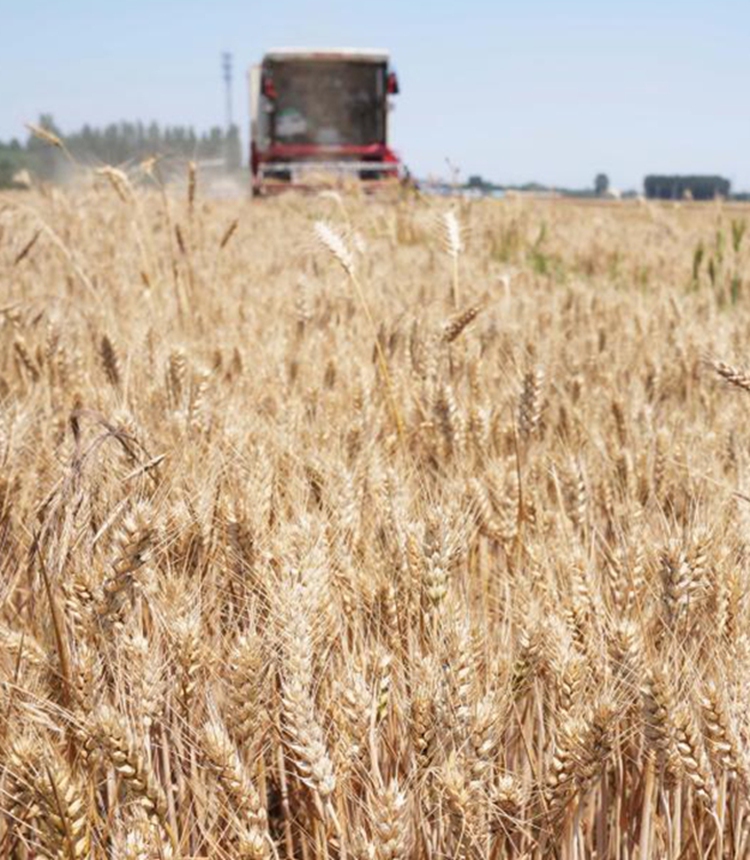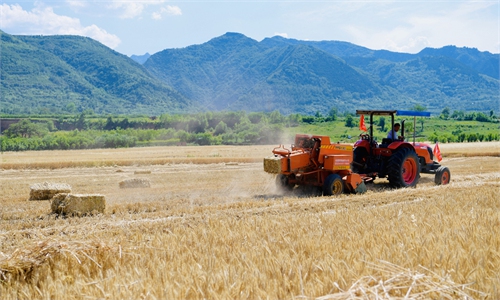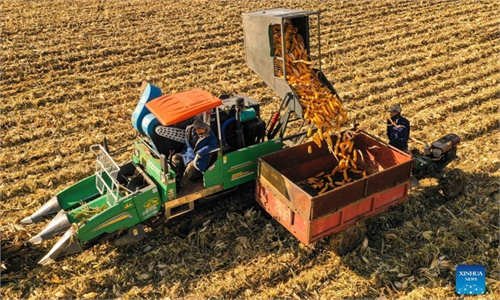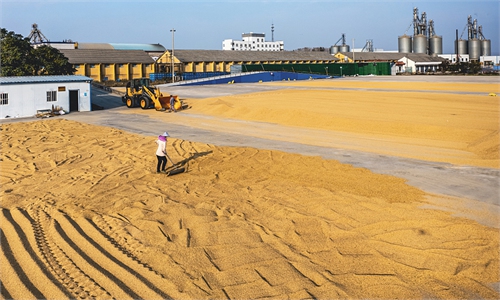China’s No.1 central document focuses on food security, rural vitalization
Annual key policy statement also focuses on rural vitalization

Reapers harvest wheat in the fields of Tancheng County, Linyi City, east China's Shandong Province, June 11, 2021. China reaped another bumper summer harvest in 2021, the country's agriculture minister said. (Photo by Zhang Chunlei/Xinhua)
China has vowed to ensure food security by holding the people's rice bowl firmly in its own hands, and to prevent rural residents who have been lifted out of absolute poverty from falling back into poverty, according to a key policy document published on Tuesday that prioritized wide-ranging efforts to boost rural vitalization.
The No.1 central document, which is issued by China's central authorities each year and is an important indicator of policy priorities for the year, has now for the 19th year in a row focused on agricultural and rural matters.
This year, the country would hold onto and strengthen the Party's overall leadership of the three rural issues - agriculture, rural areas and farmers - and firmly keep the two bottom lines intact: ensuring national food security and preventing those pulled out of poverty from falling back into poverty, according to the document published by the Xinhua News Agency.
Specifically, the document envisions stabilizing the full-year grain sown area, with grain output kept above 650 billion kilograms.
This year's No. 1 central document gives top priority to grain production and the supply of important agricultural products. The purpose is to ensure that the rice bowls of more than 1.4 billion Chinese people can mainly be filled with Chinese grain, said Minister of Agriculture and Rural Affairs Tang Renjian on Tuesday.
Last year, the country's total grain production reached 685 billion kilograms, scaling a fresh high, showed data from the National Bureau of Statistics (NBS). That suggests the nation's grain output has topped 650 billion kilograms for seven consecutive years.
As part of efforts to ensure food self-sufficiency, a push for breakthroughs in key agricultural technologies such as seed sources is among the key takeaways of the policy document.
The country's action plan for vitalizing the seed sector would be implemented in a comprehensive way, per the document, pledging to strengthen intellectual property rights protection in the seed sector, among other moves to advance progress on agricultural seed sources, considered equivalent to chips in manufacturing.
The core of this year's No.1 document is to firmly safeguard China's food security and forestall a large-scale reemergence of poverty, Wang Gangyi, a professor at Northeast Agricultural University, told the Global Times on Tuesday.
"The top priority is stability, which means to ensure stable agricultural output, steady increases in farmers' incomes, and stability and tranquility in the countryside. Everything in the document revolves around such a core," Wang said.
China is more pragmatic and problem-oriented and focuses more on addressing weaknesses and contradictions, according to Wang.
The policy document proposed the inclusion of rural households at risk of falling back into poverty or that might face sudden severe challenges into a mechanism for troubleshooting and providing various forms of support.
Those having been helped out of poverty will also get a helping hand, for instance, to develop the solar power sector in qualified regions for there to be a sustained source of additional income.
The application of live digital marketing to diversify the rural economy and the drive for digital rural transformation are also on this year's policy agenda to map out a path to rural vitalization.
China will promote e-commerce in rural areas, which will boost sales and the healthy development of agricultural and sideline products through livestreaming, Tuesday's policy document said.
Analysts said that these measures will align with efforts to consolidate and expand the nation's achievements in poverty alleviation with efforts to promote rural vitalization.
The central document coordinates China's policies, as rural revitalization can only be achieved after comprehensive poverty eradication, and finally, common prosperity, Hu Qimu, chief research fellow at the Sinosteel Economic Research Institute, told the Global Times on Tuesday.
Hu said that the stress on stability in rural work in the No.1 document is also in line with the overall tone of the Central Economic Work Conference held in December 2021, which noted that China's economic development is facing pressure from a contraction in demand, supply shocks and weakening expectations.
"Ensuring stable agricultural output is aimed at addressing the pressure on the supply shocks of agricultural products. To ensure a steady increase in farmers' incomes is to increase their consumption capacity in response to shrinking demand. To ensure stability and tranquility in rural areas is to create a favorable social environment for rural vitalization," said Hu.



